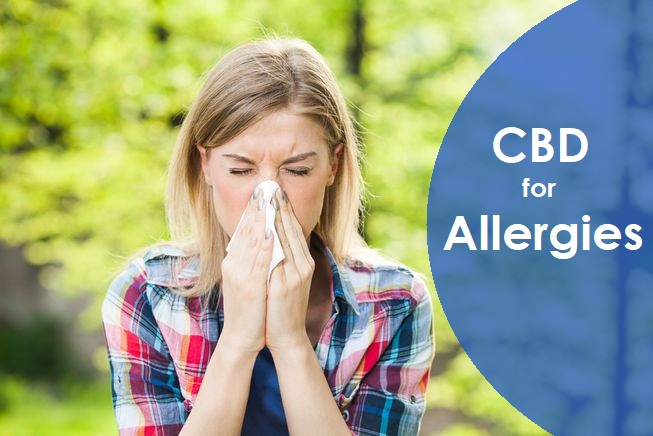Allergies can be a real pain, both in the physical and metaphorical sense. Chances are you’ve experienced some sort of allergy, whether chronic, seasonal or as a reaction to certain foods. Allergies can result from environmental exposures such as pollen, mold and animal hair. Allergies can also be inherited, or even as a combination of environmental factors, food and genes. External factors such as climate, temperature, humidity and stress can influence the severity and frequency of allergic reactions, too.
Regardless of why they started and what your symptoms are, it’s important to treat allergies as soon as they begin. If you’re searching for natural allergy remedies, you may want to consider cannabis (CBD). It’s a safe potential treatment option that can help alleviate allergic reactions and reduce inflammation.
Traditional Allergy Treatments
Antihistamines are the most popular treatment for allergic reactions. However, they often come paired with side effects such as:
Drowsiness
Nausea
Confusion
Blurred vision
CBD – a Lower-Risk Allergy Treatment
As CBD products have grown in popularity in recent years, you’ve probably heard of the cannabis compounds, or cannabinoids, cannabidiol (CBD) and tetrahydrocannabinol (THC). These cannabinoids help balance the body’s immune and cognitive systems, among other things. Both CBD and THC have been found to alleviate allergies and related symptoms, making CBD oil a lower-risk allergy treatment option than antihistamines.
THC is actually thought to suppress the immune system’s response to allergens, thereby helping to prevent allergic reactions and making it much longer for sensitization to occur. Meanwhile, CBD can be a successful treatment for seasonal allergies, because it helps regulate the behavior and production of white blood cells that react when the body is exposed to allergens. CBD has also been shown to prevent the closing of airways, which can result in coughing and breathing difficulties — common allergic reaction symptoms.
THC & CBD have been shown to help keep airways open and quell inflammation to help people cope with allergies.
Seasonal Allergies
CBD has antimicrobial properties that may help assuage the effects of seasonal allergies. High-strength CBD oil is thought to open up sinuses and relieve pressure in the nasal cavities as well as guard against nasal congestion. Seasonal allergies cause inflammation in the throat and sinuses, making it difficult to eat, drink, or even talk without irritation. Consuming CBD oil has been shown to reduce these symptoms for less painful seasonal allergies.
Inflammation
Inflammation in the human body is largely governed by the endocannabinoid system (ECS). This is a regulatory and control system that is composed of primarily two types of receptors:
Cannabinoid receptors 1 (CB1) – found mostly in the nervous system.
Cannabinoid receptors 2 (CB2) – found mostly in the immune system.
These CB-1 and CB-2 receptors are spread throughout the body and, if activated under certain conditions, can be responsible for causing inflammation. This can be decreased by CBD oil since it regulates the neurotransmitters that interact with these receptors.
Furthermore, full-spectrum CBD oil also promotes overall health by stimulating the body’s production of its own cannabinoids. This ensures that the ECS is always stable and functioning smoothly. In other words, CBD decreases the levels of inflammation in the various parts of the human body.
Sinus inflammation is a frequent sign of allergies. This condition relates closely to asthma, which is when a person’s airways become swollen and restrict the amount of air that can flow through them. CBD oil for allergies effectively treats both of these underlying conditions due to its actions on the ECS.
In addition to CB-1 and CB-2 receptors, there are also TRPV1 receptors in the ECS. CBD can decrease inflammation by acting on this third kind of receptor, as well as increasing dilation in the airways. This means that it effectively combats asthma by making your airways bigger and less susceptible to inflammation.
Chronic Pain
Allergic reactions and their related symptoms can also cause chronic pain. CBD is a safe treatment for both mild and chronic instances of pain. In addition to its anti-inflammatory properties, CBD is effective at reducing the intensity of pain. Different CBD and THC combinations can be used to target all kinds of pain. Some people prefer high-CBD blends, while others gravitate towards a more even mix of the two or a THC-free option. If you need guidance on how to choose where to start for your body’s needs, schedule a consult!
What Is The Correct Dosage For Allergies?
You can use CBD oil for allergies in addition to or in replacement of conventional allergy treatments. It does not have any negative interactions with OTC medicines or immunotherapy. However, it is always best to take CBD under the supervision of a clinician. They will be able to monitor your allergies as well as advise you on how best to treat them and proceed. Again, if you need guidance on how to find the right dose for your body, schedule a consult with us!
CBD oil can be taken as often as you like, with or without food and drink, and can even be taken with most other medications as there are no widely-known negative drug interactions associated with CBD oil. It is also very easy to take, and most people find that one or two doses daily could help reduce the incidence of allergy symptoms. This could allow you to become more active outdoors during allergy season.

